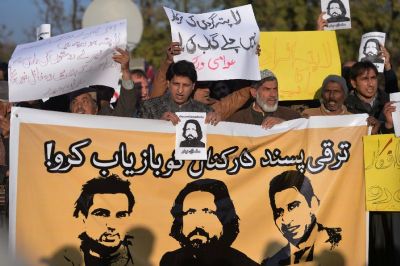Two Pakistani bloggers who vanished earlier this month have left the country fearing for their safety, relatives told AFP on Monday, following a virulent media campaign painting them as blasphemers.
They were among five men who went missing from various cities in Pakistan. Four of the five who had stood against religious intolerance and criticised Pakistan's military have been freed, their families said.
They would not comment on where the men had been held.
Their disappearances triggered nationwide protests and raised concerns of government involvement -- claims denied by officials.
Allegations on social media networks Facebook and Twitter and by right-wing TV hosts that the missing men were blasphemers has triggered a flood of threats despite denials from their worried families.
The allegation can be fatal in deeply conservative Muslim Pakistan, where at least 17 people remain on death row for blasphemy.
Liaqat Ali Goraya, the father of blogger Waqas Goraya, confirmed to AFP that his son was safe and had left the country. But his nephew Abdur Rahman Cheema, whose disappearance at the same time as his son was not reported to the media, was still missing.
"Waqas has gone, we've sent him abroad," said his father, declining to comment on who had held him. Before he went missing, Goraya was based in The Netherlands and had returned to Pakistan for a family wedding.
A source close to the family of blogger Asim Saeed confirmed he too had left the country.
His father, Ghulam Haider Akbar, told AFP the family had received death threats purporting to come from the anti-Shiite Laskhar-e-Jhangvi group.
"You who have blasphemed deserve death. You are out of Islam and should be ready for a painful punishment, which will be remembered by your generations to come," a text message said, according to Akbar.
A relative of a third blogger, who asked to remain anonymous, said both he and his family had left their home town and were in hiding.
"We are going to think about it for a few days and assess the situation. If it seems ok, we'll return, else we'll try to go abroad," the relative said.
Zeeshan Haider said his brother, poet and activist Salman Haider, was "fine and safe".
The whereabouts of the fifth man remain unknown.
Rights groups have long criticised the colonial-era blasphemy legislation as a vehicle for personal vendettas as even unproven allegations can result in mob lynchings.
A number of NGOs and observers say the online campaigns are to silence progressive voices and are carefully coordinated.
Pakistan has had a history of enforced disappearances over the past decade, but this has mainly been confined to conflict zones near the Afghanistan border or to Balochistan province where separatists are battling for independence.
January 30, 2017
Freed Pakistani bloggers go abroad for safety
Date
January 30, 2017
Title
Freed Pakistani bloggers go abroad for safety
Author(s)
AFP
Original Source

